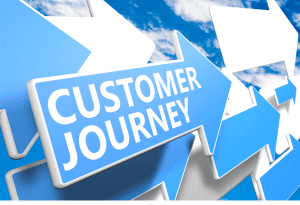
Consumers live moment to moment, and organizations must meet them every step of the way using insights to improve the customer journey.
Understanding the customer journey is critical to providing for customer needs – and speed and agility allow businesses to achieve actionable insights from data to drive better business results. Data teams need to consider rethinking existing technology stacks to focus on quality data to deliver moments-based experiences.
Here’s why that matters: consumers live moment to moment, and organizations must meet them every step of the way. That requires adopting the right technology and platforms to do so, allowing organizations to engage with consumers at each stage of their unique journeys. Analytics generated from quality data enable CX and marketing teams to understand what customers really want and how to engage them at just the right time. Moreover, it can help organizations understand the points of friction that frustrate consumers and separate the behavior of genuine users versus that of harmful actors like fraudsters, protecting customers along the way.
Still, a recent Forrester survey found that 61% of respondents said capturing and making sense of digital customer data is difficult for them. Typically, this challenge stems from a handful of scenarios. For example, perhaps an organization isn’t collecting enough data, or they don’t have tools to make sense of it, or their team needs better experience analyzing it. Each of these scenarios can delay getting to the actionable insights their business needs to grow the business. When looking to solve this problem, organizations will likely change vendors – but the issue at the core is a poor data pipeline.
Rather than collecting quality, usable data in real-time, we see that organizations are too often collecting inaccurate or untimely data that doesn’t support the business with the speed or impact it needs. However you slice it, there’s a real financial cost to not understanding customer data, and it can impact downstream applications and decision-making. So, in today’s high-speed, technology-driven climate, it’s critical that businesses invest in solutions and processes that help them make sense of their data – with scale and efficiency – and resolve core challenges like fraud that create friction and add unnecessary cost.
See also: How Digital Trust Can Overcome Fraud’s Impact on the CX
Cloud is data’s foundation
Instead of adding to complex downstream technology stacks, data teams should first focus on implementing the right platforms to collect and analyze data in real-time. Real-time data allows for real-time data analytics applications – like faster decision-making, increased business agility, quicker detection of operational or internal issues, trend, and market change awareness, and more. These platforms help businesses reach optimal speed to insight – the competitive edge modern businesses need.
The universal move to cloud and infrastructure-as-a-service has made businesses more efficient and provided the platforms to generate and use actionable data. Businesses need rich data sets to understand what’s happening on their systems, as well as a quick way to react and respond. To store, manage and properly analyze this data with helpful platforms, organizations are largely turning to cloud data warehouses.
According to Marketwatch, the cloud data warehouse market is predicted to grow at 31.4% annually over the next five years and will reach a value of $39.1 billion by 2026. That’s because data generation is growing at a rapid pace, and enterprises are capturing and creating more data than ever before. Cloud data warehouses are an affordable option while allowing businesses to continue growing.
And as data capture rises, organizations must make sense of it all and put data to work. This is how real-time quality data is driving insights that make businesses better and can be used to improve the customer journey.
See also: 3 Key Methods to Prevent Fraud in Fintech Startups
Customer journey requires real-time insights
Cloud data platforms are guiding business efficiency because they’re able to take generated data in the cloud in real-time, analyze that data and transform them into actionable insights for speedy response and decision making. This is critical to the customer journey.
Take fraud, for instance. Protecting customers from online fraud and financial crimes is necessary to deliver a frictionless customer experience. In fact, we found that when surveying the fraud management industry, there’s a significant amount of commentary about profiles and how to use them to limit fraud losses. However, many solutions lack a complete, detailed profile for all users that interact across digital channels.
Effective fraud detection starts with knowing your customer and implementing identity and fraud detection systems. These systems, though, can interrupt the flow of the real customer’s day-to-day activities, commonly known as creating a false positive.
Organizations commonly identify fraud based on indicators like unexpected devices and geolocation, anonymous IPs, and failed login attempts, but fraud tactics are evolving. Traditional fraud detection solutions rely on identifying past fraudulent behavior, while advanced technologies build on this by distinguishing real customers versus fraudulent ones in real-time. A fraudster can easily gain a user’s ID, password, and account number, but user behaviors are unique and harder to mimic.
The benefits of behavior detection include:
- Behaviors can now be recorded (behind the scenes) and compared to detect fraud.
- Collecting individual customer behavior provides data to specifically identify who the customer is.
- Fraud detection platforms running on the cloud can capture that data to provide invisible and continuous authentication, real-time business protection across all digital touchpoints, and reduce false positives with more accurate fraud detection.
- All the while, the customer experience remains uninterrupted, and businesses gain more vital customer insights.
Fraud detection platforms provide these types of advancements. They can capture real-time behavioral analytics from the entire digital journey to truly understand customers’ unique behaviors. These platforms can also provide real-time behavioral biometrics so organizations can continuously authenticate users and identify suspicious activity, detect fraudsters in their tracks, and flag unusual activity.
Ultimately, collecting the right data to understand customers and track real-time activity can stop criminals in the act, prevent financial fraud loss, and protect both customers and the business. And considering fraud can derail customer experiences and business performance, fraud detection platforms can give businesses the efficiency boost they need – and create that “speed to insights” that moves businesses forward.





























